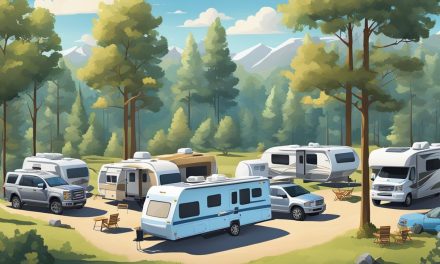Would you like to save this article?
RV travel is often marketed as a budget-friendly way to explore the open road, but hidden costs can sneak up on even the savviest adventurers. Many RVers end up spending more than necessary on items and services they don’t actually need, all while trying to maintain their dream of freedom and exploration.
By cutting out certain expenses, you can save money without sacrificing the joy of RV life. Whether you’re a weekend warrior or a full-time traveler, these tips will help you avoid unnecessary spending. Let’s dive into six RV travel expenses you can skip—and maybe have a laugh along the way.
1. Expensive Campground Fees
Many RVers assume they need to book high-end campgrounds, but there are plenty of free or low-cost alternatives. Public lands managed by the Bureau of Land Management (BLM) offer free dispersed camping in many areas.
Some truck stops, Walmarts, and Cracker Barrels also allow overnight parking for free.
If you prefer campgrounds, look for state parks or national forests with lower fees compared to private RV resorts that charge $50–$100 per night. Staying in one spot longer can also save money since many campgrounds offer discounts for weekly or monthly stays. Why pay for a pool and shuffleboard court you’ll never use? Unless your dog really loves shuffleboard.
2. Overpriced RV-Specific Gadgets
From fancy tire pressure monitoring systems to overpriced sewer hoses, the RV market is flooded with gadgets you don’t always need. Basic tools and equipment often work just as well and cost significantly less.
For example, a regular surge protector can be just as effective as an “RV-specific” one that costs twice as much.
Similarly, basic kitchen gear from home can replace expensive space-saving RV cookware sets. Pro tip: If it has the word “RV” in the name, it probably comes with a 30% markup. Who knew “RV” stood for “Ridiculous Value”?
3. Premium Fuel
Unless your rig specifically requires premium fuel (and most don’t), there’s no reason to pay extra at the pump. Regular unleaded will do just fine for most gas-powered RVs, while diesel engines perform well on standard diesel fuel.
Over time, choosing premium unnecessarily can cost hundreds of dollars on long trips. Save that money for something more fun—like ice cream at every stop! Unless your RV has a sweet tooth too, in which case… good luck.
4. Frequent Dining Out
While it’s tempting to sample local cuisine everywhere you go, eating out regularly can drain your wallet fast. Instead, stock up on groceries and prepare meals in your RV kitchen or over a campfire.
Bulk buying non-perishables like pasta and canned goods can save space and money, while fresh produce from local farmers’ markets supports small businesses and keeps costs down. Plus, nothing beats dining under the stars with food you made yourself—unless you burn it, in which case there’s always peanut butter sandwiches.
5. Unnecessary Insurance Add-Ons
While insurance is essential for any RVer, many policies include add-ons you don’t need. Roadside assistance is often bundled with memberships like AAA or Good Sam Club at a lower cost than through your insurance provider.
Similarly, collision coverage for older RVs may not be worth it if the deductible exceeds the vehicle’s value. Review your policy carefully to ensure you’re not paying for extras that don’t serve you—because who needs insurance for alien abductions anyway? Unless you’re camping near Area 51.
6. Too Many Souvenirs
It’s easy to get caught up in buying trinkets from every stop on your journey, but these items take up precious space in your RV and add unnecessary weight (which impacts fuel efficiency). Instead of souvenirs, focus on capturing memories through photos or journaling about your adventures.
If you must buy something, opt for small, practical items like postcards or magnets that won’t clutter your space—or weigh down your rig like that life-sized moose statue seemed to do.






